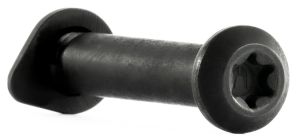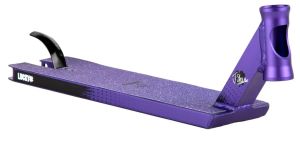Kaip pasirinkti paspirtuką pradedantiesiems
FREESTYLE SCOOTERS FOR BEGINNERS
WHO IS A BEGINNER?
Freestyle scooters for beginners are designed for the riders below:
Age: 6 to 12 years old
Rider weight: up to 40 kg
It is important to note that damage to beginner scooters mainly occurs as a result of incorrectly performed tricks or performing tricks for which the scooter was not designed.
For beginners, as a matter of principle, performing tricks incorrectly is commonplace. It is therefore important to only perform or learn tricks for which the scooter was designed.
THE CORRECT WAY TO USE ENTRY-LEVEL SCOOTERS
1. Entry-level scooters were designed for learning basic tricks i.e. bunnyhop, tailwhip, 180, barspin, then for learning basic moves in the skatepark and last but not least for learning basic street tricks i.e. grinds & slides.
2. Moreover, these scooters were designed for skatepark riding, whereby the rider follows the surface of obstacles, i.e. radiuses, fun boxes, pyramids, bowls, etc.
3. And last but not least, scooters for beginners were designed for casual riding outside the skatepark. However, it is advisable that beginners ride on flat and clean surfaces (remember that rocks, chips and other debris will damage the wheels).
HOW TO USE ENTRY-LEVEL SCOOTERS INCORRECTLY
1. Jumping from heights greater than 20 cm
2. Frequent grinding
3. Lending scooters to older friends
4. Long and continuous braking
5. Riding a scooter with loose parts (loose wheels, loose headset).
6. Riding in the rain or otherwise wet conditions
SELECTING A SCOOTER FOR BEGINNERS
You will not find scooters for beginners at Gizmania. But don't be fooled. This is because we only offer quality products and assume that our customers will be actively involved in freestyle scootering for some time. This is why we have freestyle scooters categorized by their predominant use. Of course, you can also select a scooter based on the rider's skill status, i.e. "intermediate" or "advanced" rider. In this case, use the filter and select the desired skill level. If your child is a complete beginner, select a scooter from the "universal scooter" category and then select "intermediate" in the filter.
Freestyle scootering is no different from any other sport. Approximately one in five beginners stay within the sport and engage in freestyle scootering for a long period of time. Consequently, many children stay with their first scooter and do not carry on in the sport.
Important note: If your child is sports-minded, already does some sport regularly and is therefore likely to engage in freestyle scootering, then the question is whether to consider a basic scooter at all.
A sports-oriented child who practices freestyle scootering several times a week, even as a side sport, will soon outperform the cheapest of scooters. Motivated kids learn quickly.
The transition from a basic scooter to a higher quality scooter is another chapter. We don't sell these cheap, basic scooters at Gizmania, but they are available in many stores, especially sporting retail chains. These basic, inexpensive scooters often use a different compression system than the one freestyle scooters use. Upgrading a cheap scooter to a higher quality scooter is thus quite expensive and basically makes no economic sense.
VERY OFTEN WE ENCOUNTER THE FOLLOWING SITUATION:
Basic scooters usually use a threaded & non-integrated headset, 100 mm diameter wheels and a fork that is only compatible with 100 mm diameter wheels.
Parents ask:
"The child has destroyed the plastic wheels in a few months and now would like wheels with a 110mm aluminium core".
Our answer:
"It's not worth it. The upgrade will be very expensive and will exceed the value of your existing scooter many times over. In addition to the wheels, you will also need a new threadless fork. The price for the upgrade will be at least 100 €. What are the options? Either get 100 mm wheels again or sell your existing scooter and buy one that meets your new requirements.




